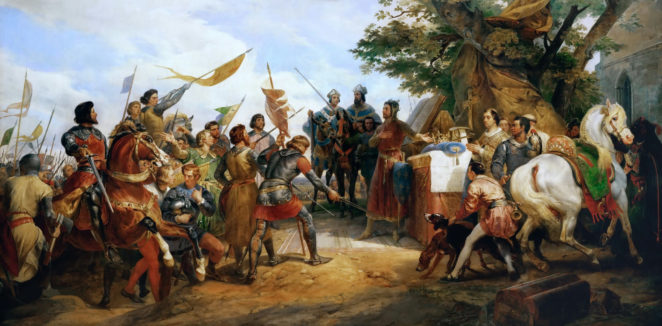
The story of the Battle of Bouvines, fought in 1214, is one
of a “dead cert” plan that turned out to be far from cut and dried.
Otto IV, the Holy Roman Emperor, thought that a good way of
keeping his barons loyal would be to invade France and reward his followers by
giving them large pieces of captured territory. However, he was not sure that
he could do this without some help, so he called on three other supposedly powerful
warlords to join him in this quest.
These were Ferrand (Count of Flanders), Reginald (Count of
Boulogne), and King John of England, who would presumably have had some
sympathy with a fellow monarch who had problems with his barons.
The plan was for King John to land on the French coast and
head for Paris, creating mayhem as he did so, while the other three invaded
from the northeast. The problem with the plan was that it depended on John
being able to get something right, but Otto should have known better.
The French King Philip Augustus met King John’s army at
Angers on 2nd July 1214 and had an overwhelming victory. That left him free to
concentrate on the other invaders and to gather reinforcements for his own army
as he moved towards them.
The opposing forces met at Bouvines near Lille on 27th
July. Philip’s army was still smaller than that ranged against him, and it
looked at first as though Otto and his allies would prevail. However, Philip’s
cavalry eventually got the better of the allies’ infantry and were able to
achieve a decisive victory.
Philip’s personal bravery was an important factor in battle,
as he was able to encourage his men to redouble their efforts after he had been
unhorsed and almost killed but was then able to remount and carry on.
Otto’s failure to conquer France led to his own removal as
Emperor and his replacement by Frederick II. John’s defeat only served to
reinforce his weakness in the eyes of his own barons, who were emboldened to
push through their own “revolution” of forcing King John to sign Magna Carta
the following year.
The actions of Philip Augustus in recruiting men from the
merchant class of France to join his army showed that French nationalism was
not the sole prerogative of the knightly class. This was itself an important
development in the history of Europe.
© John Welford
No comments:
Post a Comment